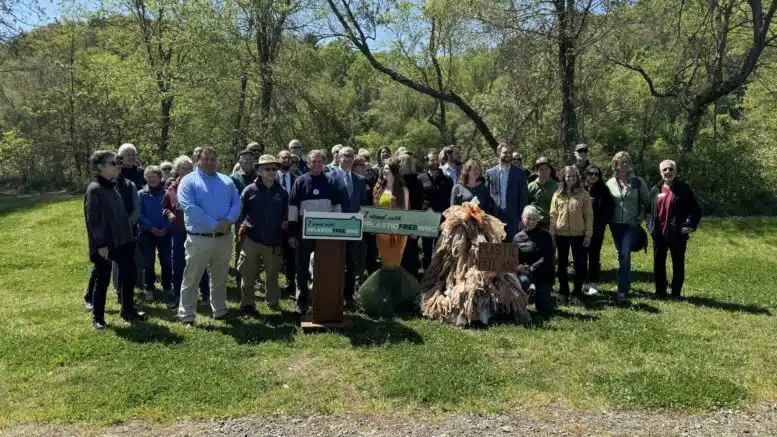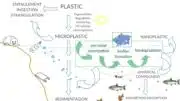By Will Atwater
Seven months after a provision added to the 2023-24 North Carolina state budget prohibited municipalities from establishing single-use plastic bag ordinances, a group of Western North Carolina environmental advocates is pushing back.
On Earth Day, against the scenic backdrop of a clear blue sky and the majestic French Broad River, nearly 60 people gathered at Silverline Park in Woodfin, north of Asheville, for an event they called the Planet vs. Plastics: Earth Day Press Conference. Among those present were the French Broad Riverkeeper, local mayors, state policymakers and members of environmental organizations, including the Sierra Club and the National Resources Defense Council.
The event was organized by MountainTrue, a local environmental advocacy group, to discuss a renewed commitment by local municipalities to “phase out plastic bags, single-use plastics and Styrofoam” by partnering with businesses and residents and “to reduce their plastic footprint,” according to a release.
“We’re not here to wage war on all plastics but to reduce the kind of hard-to-recycle plastics that are used once and then thrown away,” said Karim Olaechea, MountainTrue’s deputy director of strategy and communications. “These single-use plastics clog up our rivers — like the beautiful French Broad. But we can reduce that pollution by passing common sense laws.”
Not only does plastic waste collect in waterways, landfills, parks and trees, over time, plastic waste breaks down into tiny micro- and nanoplastic particles and can starve and suffocate land and marine animals when digested.
Several studies have also linked microplastics to adverse health outcomes for humans.
A 2019 study commissioned by the World Wildlife Fund found that humans digest roughly 5 grams, or a credit-card size amount, of microplastics weekly. Another study found that people with inflammatory bowel disease had a higher quantity of microplastic particles in their feces than healthy people. (Crohn’s disease and ulcerative colitis are two forms of IBD.) Microplastics have been linked to hormone disruption and cancer. Recently, researchers reported possible links between microplastic accumulation in humans and heart disease.
What’s more, humans ingest between 78,000 and 211,000 microplastics annually from a range of sources such as food, water, skincare products and the air we breathe, according to information published by the EarthDay.org website.
‘Downcycled’
Before the passage of the 2023-24 state budget, Western North Carolina advocates were among a coalition of municipalities and organizations working toward establishing single-use plastic bag ordinances aimed at reducing plastic waste. But a provision added to the more than 600-page budget bill prevented municipalities from moving forward. The legislature mandated that municipalities would not have authority to enact plastic bag bans.
Environmentalists argue that to reach the goal of reducing greenhouse gas emissions — the kindling that’s warming the planet — and prevent Earth’s average temperature from increasing by 1.5 degrees Fahrenheit by 2050, we must curb our appetite for single-use plastics.
According to EarthDay.org, global plastic bag production last year exceeded 100 million units, averaging roughly 1 million bags per minute. And, 82 percent of North Carolinians believe that single-use plastics should be reduced, according to a release by MountainTrue about a poll conducted by Maxon-Dixon Polling and Research Inc.
Opponents of plastic bag bans, such as the North Carolina Retail Merchants Association and the American Chemistry Council, argue that all that’s needed to solve the plastic pollution problem is to shore up the nation’s recycling program.
This argument is a nonstarter among environmentalists.
“Plastics recycling does not work,” said Anna Alsobrook, MountainTrue’s watershed science and policy maker. “We have great success with aluminum, great success with cardboard — plastic does not work. It’s too complicated,” Alsobrook said. “When you look at a plastic item and you see that triangle on the bottom of it, you have been tricked to think that that means it’s recyclable.”
Alsobrook said that the number inside the triangle refers to the type of resin used to make the bottle, and only bottles with the numbers 1 and 2 can be recycled in the United States. The other numbers, she said, can’t be recycled. For those that can be recycled, they are downcycled, she said, which means resins from a plastic bottle may be used to create a “lesser-quality product” and that resulting product is no longer recyclable.
Love thy neighbor
Sarah Ogletree, director of Creation Care Alliance, a faith-based environmental advocacy organization serving the Southern Blue Ridge region, was the last to speak at the Earth Day event and reminded everyone that caring for the Earth and its inhabitants is part of the Christian faith tradition.

“This is an issue of how we love each other, how we care for each other and also how we care for our bodies. Love demands tangible action,” she said. “I can’t love my neighbor if I don’t love the air they breathe, the water they drink and the ground in which their food is grown. Right now, the water, the air and the ground is absolutely full of micro- and nanoplastics.
“I want to say that our congregational network and I are incredibly grateful for all of the action being taken locally by our leaders. I also want to call on our elected leaders, in Raleigh and elsewhere, to continue to do more […] because love demands that of us.”

Ken Brame, a member of Sierra Club Western Carolina Group, says the group is focusing on lobbying the grocery store chain Ingles and Walmart to stop carrying plastic bags in stores. To this end, the group has started a petition-signing initiative that will continue into the summer as the Sierra Club tries to establish a dialogue with Ingles, Brame said.
Before leaving the event, N.C. State Rep. Caleb Rudow (D-Buncome) said that while state elected officials thwarted last year’s efforts to establish single-use plastic ordinances in Western North Carolina and other parts of the state, the people still hold the ultimate power.
“That’s how the system should work … People who pass bad policies and pass them behind closed doors and don’t listen to their constituents should face the ballot box in November,” he said.














